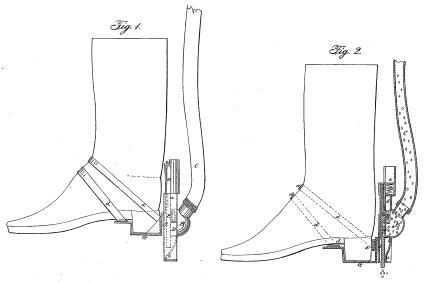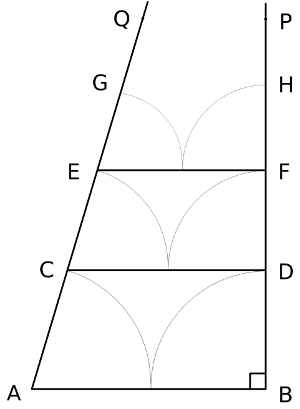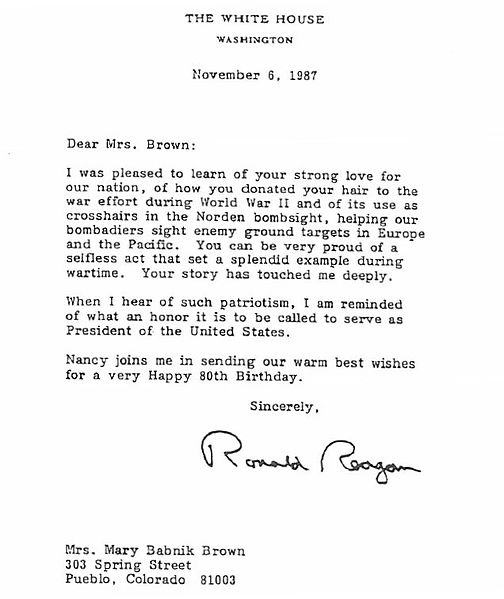
To commemorate the defeat of the Spanish Armada, England struck a medal bearing the device of a fleet flying under full sail.
The inscription read Venit, vidit, fugit — “It came, it saw, it fled.”

To commemorate the defeat of the Spanish Armada, England struck a medal bearing the device of a fleet flying under full sail.
The inscription read Venit, vidit, fugit — “It came, it saw, it fled.”

George Meacham invented this convenient planting device in 1856. Strap a seed bag to your waist and a plunger to each boot and you can plant corn effortlessly while strolling in your fields.
And maybe afterward you can dispense popcorn at the campfire.

A lump of clay exists on Monday. On Tuesday it’s fashioned into a statue. Are the lump and the statue the same thing? It would appear not: The statue didn’t exist on Monday, and it wouldn’t survive being squashed, but the lump did and would. But if the lump and the statue are two different material objects, how can they coincide? How can two things exist in the same place at the same time?
Some of your old books may contain hidden artworks: Beginning in the 17th century, a book’s binder would sometimes paint a watercolor scene on the edge of the book’s page stack. If the pages were then gilded, the image might remain hidden for years until the pages were fanned.
Sometimes two different images are hidden in the same book, revealed successively when the pages are fanned “up” and “down.” In rare cases paintings are hidden not just on the book’s fore edge but on the top and bottom as well, offering a panoramic view of the painting’s subject.

One last striking story about bird mimicry:
I was in the Outer Hebrides and I came across an abandoned derelict croft. It had no roof, but very substantial walls and in the gaps between the stonework was a starlings’ nest. I could hear the birds inside, and eventually one of the starlings came to defend its territory. I heard straight away that it wasn’t just the usual rambling song. It started to mimic a Corncrake, a species that is very rare in mainland Britain. It did this bird’s buzzing repetitive song, but then it immediately went into other sounds that seemed familiar and had a strong rhythm to them. As I was listening I was looking around and could see the remnants of farm machinery, including an ancient tractor that had not moved for 20-30 years. I realised this bird was singing the song of some of this machinery. It was singing the song of a mechanical pump that had obviously been active around this farm, and used by the people who had lived here.
I wasn’t listening to the same starling that heard these original sounds. These copied sounds are usually passed on from parents or neighbouring birds so that a young bird absorbs and then duplicates them. The strange thing was that I was recording the sounds in what had been somebody’s living room, a place that had obviously been full of the conversations of family life over generations and which had passed into history. Yet the birds had returned and taken it back — claimed this space and these rocks — and were singing their own song. And they were singing the songs that were around when the people were here.
— Chris Watson of Tyne and Wear, U.K., quoted in Mark Cocker’s Birds & People, 2013
“One will rarely err if extreme actions be ascribed to vanity, ordinary actions to habit, and mean actions to fear.” — Nietzsche
A letter from “J. A. McM.,” West Lynn, Mass., to Mark Twain, April 17, 1907:
Dear Sir:–
Apropos of your very entertaining little book on ‘English as she is Taught’ — the following true story fits in well — A teacher asked her class of boys to tell the difference between herself and a clock. A bright little urchin in the rear row raised his hand and said — ‘You have a face and the clock has a face, and you have got hands and the clock has got hands, and — and (reflecting) the clock has got a pendooleum and you aint.’
On the envelope Twain wrote, “Preserve this. Frame it. It is the second time in 40 years that a stranger has done me a courtesy & charged me nothing for it.”

A paradox attributed to Proclus Lycaeus (412-485):
Consider two nonparallel lines, AQ and BP. BP is perpendicular to AB; AQ isn’t. Find the midpoint of AB and mark AC = BD = AB/2. Now if AQ and BP are going to intersect, it can’t happen on AC or BD; if it did, say at a point R, then that would give us a triangle ARB where the sum AR + RB < AB, which is impossible. But now we can connect CD and follow the same process: CE and DF can't intersect for the same reason. EG and FH are likewise ruled out, and so on up the line forever. This seems to mean that two nonparallel lines will never intersect. That can’t be right, but where is the error?
(From Alfred Posamentier, Magnificent Mistakes in Mathematics, 2013.)
He found a formula for drawing comic rabbits:
The formula for drawing comic rabbits paid.
So in the end he could not change the tragic habits
This formula for drawing comic rabbits made.
— Robert Graves

In 1943, Colorado broom factory worker Mary Babnik Brown saw an advertisement in a Pueblo newspaper soliciting blond hair, at least 22 inches long, that had not been treated with chemicals or hot irons. Brown had never cut her hair, which she combed twice a day and washed twice a week with pure soap. When her samples were deemed acceptable, she cut off all 34 inches and sent it in, considering this her contribution to the war effort, though “I cried for two months.”
At the time she was told that her hair would be used in meteorological instruments. It wasn’t until 1987, the year of her 80th birthday, that she learned that it had been used in the Norden bombsight, a top-secret instrument that guided bombs to their targets. Engineers had determined that fine blond human hair worked ideally in crosshairs, but the technology was a closely guarded secret, so the donors weren’t told how their contributions would be used. “I couldn’t believe it when they told me,” Brown said. “All I knew was that they needed virgin hair.”
She did get some compensation: Pueblo declared Nov. 22, 1991, “Mary Babnik Brown Day,” she was inducted into the Colorado Aviation Historical Society’s hall of fame, and Ronald Reagan sent her this letter:
